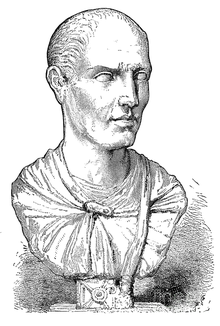
Back لوكولوس Arabic لوكولوس ARZ Lusi Lisini Lukull Azerbaijani Лукул Bulgarian Luci Licini Lucul·le Catalan Lucullus Czech Lucius Licinius Lucullus Welsh Lucius Licinius Lucullus German Λούκουλλος Greek Lucio Licinio Lúculo Spanish
Lucullus | |
|---|---|
 Engraving of a marble bust traditionally[1] said to be Lucullus (Hermitage Museum) | |
| Born | 118 BC |
| Died | 57/56 BC (aged 61 or 62) |
| Nationality | Roman |
| Office | Consul of Rome (74 BC) |
| Spouse(s) | Claudia Servilia |
| Parents |
|
| Military career | |
| Years | 91–66 BC |
| Conflicts | |
Lucius Licinius Lucullus (/ljuːˈkʌləs/; 118[2]–57/56 BC) was a Roman general and statesman, closely connected with Lucius Cornelius Sulla. In culmination of over 20 years of almost continuous military and government service, he conquered the eastern kingdoms in the course of the Third Mithridatic War, exhibiting extraordinary generalship in diverse situations, most famously during the Siege of Cyzicus in 73–72 BC, and at the Battle of Tigranocerta in Armenian Arzanene in 69 BC. His command style received unusually favourable attention from ancient military experts, and his campaigns appear to have been studied as examples of skillful generalship.[3]
Lucullus returned to Rome from the east with so much captured booty that the vast sums of treasure, jewels, priceless works of art, and slaves could not be fully accounted for. On his return Lucullus poured enormous sums into private building projects, husbandry and even aquaculture projects, which shocked and amazed his contemporaries by their magnitude. He also patronized the arts and sciences lavishly, transforming his hereditary estate in the highlands of Tusculum into a hotel-and-library complex for scholars and philosophers. He built the famous horti Lucullani (Palace and gardens of Lucullus) on the Pincian Hill in Rome, and became a cultural innovator in the deployment of imperial wealth. His achievements led Pliny the Elder to refer to him as "Xerxes in a Toga". He died during the winter of 57–56 BC[4] and was buried at the family estate near Tusculum.
The conquest agnomen of Ponticus is sometimes incorrectly appended to his name in modern texts. In ancient sources it is attributed only to his consular colleague Marcus Aurelius Cotta after the latter’s capture and brutal destruction of Heraclea Pontica during the Third Mithridatic War.
- ^ "The bust in the Hermitage, No. 77, published in Arch. Zeit. 1875, PI. Ill, is not a portrait of L. Licinius Lucullus or even of an admiral, but of a lictor. The relief at the base represents a lictor's axe, and the costume is that of the lictors on the Arch of Trajan at Beneventum," observed G. Hauser, in Jahrbuch der Oesterreichisches Archiv I. 10 1907, pp. 153–56, reported in American Journal of Archaeology 12 1908, p 236.
- ^ The only comprehensive discussion of his birthdate is that of Sumner 1973, pp. 113–14 who settles on 118 BC as the most likely year, with 117 a marginal possibility.
- ^ Cassius Dio XXXVI. In captured correspondence of Mithradates VI Eupator, Lucullus was rated as the outstanding general since Alexander (Cicero Acad.Pr.II)
- ^ Bennett 1972, p. 314